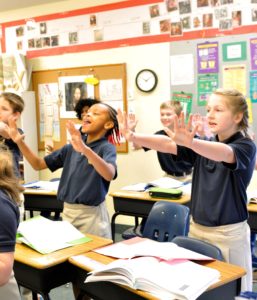
“The world is full of knowledge, and finding the links between fields of study can be a mind-twisting task. A classical education meets this challenge by taking history as its organizing outline — beginning with the ancients and progressing forward to the moderns in history, science, literature, art and music. Systematic study also allows the student to join what Mortimer Adler calls the ‘Great Conversation’ — the ongoing conversation of great minds down through the ages. Much modern education is so eclectic that the student has little opportunity to make connections between past events and the flood of current information. ‘The beauty of the classical curriculum,’ writes classical schoolmaster David Hicks, ‘is that it dwells on one problem, one author, or one epoch long enough to allow even the youngest student a chance to exercise his mind in a scholarly way: to make connections and to trace developments, lines of reasoning, patterns of action, recurring symbolisms, plots, and motifs.’”
Susan Wise Bauer (The Well Trained Mind)
Classical Education recognizes that a child’s brain develops in stages and seeks to utilize each stage of cognitive development to promote mastery. SSCCA’s curricula, following the classical Trivium, is divided into three stages of learning: the Grammar Stage (PreK – 6), the Logic Stage (7-9) and the Rhetoric Stage (10-12).
In the Grammar Stage (elementary school years) when children easily memorize information, SSCCA students focus on math facts, Bible and history chronology, Latin endings, and the rules of spelling, phonics, and English grammar. Through recitation, chanting, song, and modeling, children at SSCCA learn a wide body of information as they master core subject matter. In addition to traditional studies in arithmetic, reading, and writing, students are immersed in the history of mankind as they follow ancient civilizations from the Egyptian Empire to the rise and fall of Rome. From the Middle Ages to the Explorers and the founding of America, SSCCA students help make history come alive as they create art projects, living ‘wax museums’, and participate in feasts donning period costumes.
As they enter into the analytical or Logic Stage (middle school years) of learning development, students at SSCCA study algebra, science, English composition, the Great Books of Western Civilization and Christian Tradition, Latin, and logic. SSCCA students graduate from our upper school primed for success in high school and beyond.
St. Stephen’s Classical Christian Academy has been a blessing to our family in many ways. Our three sons (two of which are now in college and one in an all boys private school) have thrived in the classical approach to education and it has helped them transition beautifully into high school. We have even found that the educational standards and rigor of the curriculum have many benefits as they have headed into college.
Deanna and Ed Dovel

